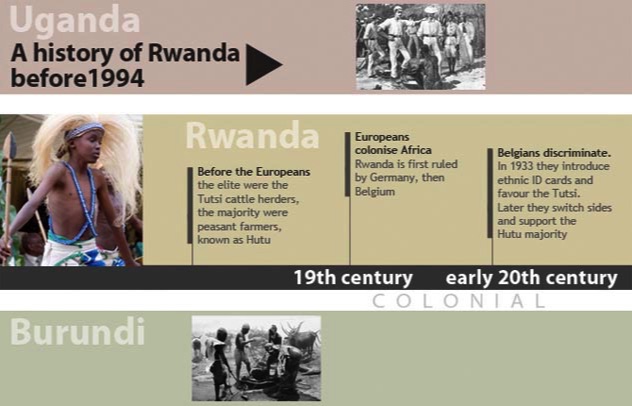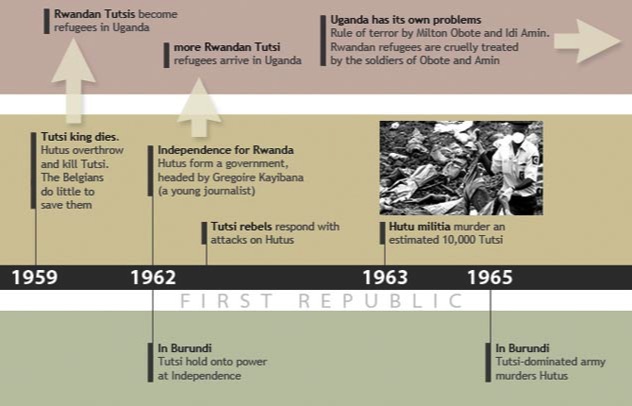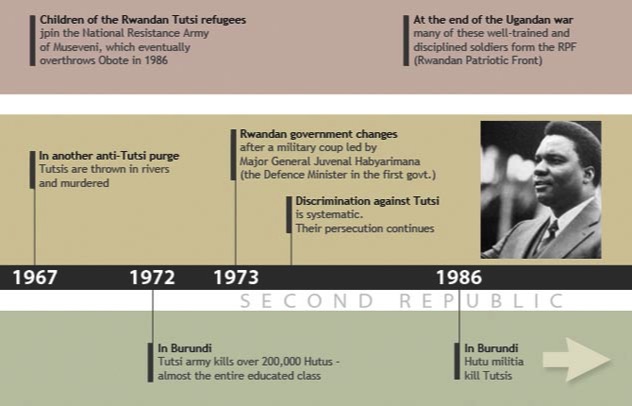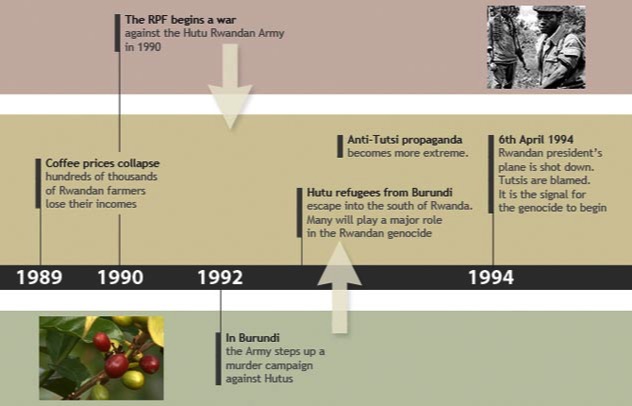Encounters with conflict and peace
A history of conflict
Before the Europeans...
In pre-colonial times the division between Hutu and Tutsi was sometimes blurred.
Some Hutu bought cattle and were accepted into the aristocracy. Some Tutsis became poor peasants. Tutsis who owned large herds of cows sometimes exploited their power over Hutu farmers…

"A Hutu peasant would be given a cow, in return for which he would make himself available for work on the land of his patron. Not every Tutsi landowner exploited his Hutu vassals, but there evolved over time a dangerous sense of second-class citizenship among the Hutus.
The Tutsi nobility that dominated the centre of Rwanda stressed the importance of physical stature, that is, they claimed their tallness and aquiline facial features were synonymous with superiority. Those who were short and stocky, who worked the land, and who had neither cattle nor ties to the nobility became a distinct second class in Rwandan society. Journalists who have interviewed Hutu peasants have frequently been told that Tutsis look down on them as 'subhumans'.
Any peasants who opposed the evolving order were treated with unmitigated harshness. Tutsi nobles showed no hesitation in massacring the occupants of rebellious villages and confiscating their property."
From Season of Blood. A Rwandan Journey
Independence and revolution
After the Second World War (39-45) many countries which had been under European colonial rule increased their push towards independence…

"In Rwanda, alone in all of Africa, the liberation movement assumed the form of a social, antifeudal revolution... Groups of peasants, enraged, inflamed Hutus armed with machetes, hoes, and spears, moved against their master-rulers, the Tutsis. A great massacre began, such as Africa had not seen for a long time. The peasants set fire to the households of their lords, slit their throats, and crushed their skulls. Rwanda flowed with blood; the peasants, often for the first time in their lives, could eat as much meat as they wished.
At this time, the country had a population of 2.6 million, including 300,000 Tutsis. It is estimated that tens of thousands of Tutsis were murdered, and as many fled to neighbouring states- to the Congo, Uganda, Tanganyika, and Burundi. The monarchy and feudalism ceased to exist, and the Tutsi caste lost its dominant position. The Hutu peasantry now seized power."
From The shadow of the sun. My African life
The Belgians did little to protect the Tutsi minority from this wave of killings which Bertrand Russell described as “the most horrible and systematic human massacre… since the extermination of the Jews by the Nazis.”
Related pages
origins
Real differences
A HISTORY OF CONFLICT"You will never see the source of a genocide. It is buried too deep in grudges, under an accumulation of misunderstandings that we were the last to inherit... more
origins
Colonialism
THE POLITICS OF RACISMEarly colonists - the Germans and the Belgians - brought a strange collection of pseudo-scientific race theories. They also found the Tutsi easier to deal with, so decided that the Tutsi were probably... more
origins
Hutu and Tutsi
A HISTORY OF CONFLICTThe ideas around Hutu and Tutsi have played a big part in Rwanda's history. Confused about who's who? Find out what Hutu and Tutsi has meant to Rwandans... more
< previous page | next page >
In this section
A HISTORY OF CONFLICT
Real differences
Hutu and Tutsi
A history of conflict
THE POLITICS OF RACISM
Colonialism
A messy power shift
Refugees and scapegoating
Cheap tricks
Preparing for genocide
INSIGHTS
Pressures
In the villages
STORIES
My friend the killer

Real differences
Hutu and Tutsi
A history of conflict
THE POLITICS OF RACISM
Colonialism
A messy power shift
Refugees and scapegoating
Cheap tricks
Preparing for genocide
INSIGHTS
Pressures
In the villages
STORIES
My friend the killer









